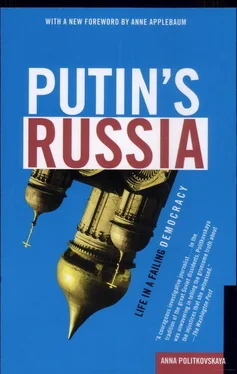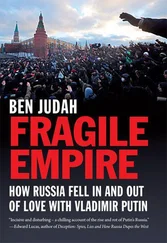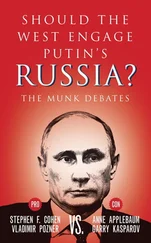Nina said nothing. What was the point of talking to a person with no heart, brain, or soul?
“But surely that’s easiest, isn’t it? Rather than me having to go all the way to Bryansk?” the soldier continued uncertainly.
Of course it was easier. There is no denying that soullessness makes life easier. Take the minister of defense, Sergey Ivanov, a crony of the president since Putin’s FSB days in Saint Petersburg. Every week Ivanov appears on television to deliver the president’s war bulletin. Nobody will make us “kneel down before terrorists,” he says; he intends to pursue the war in Chechnya to its “victorious conclusion.” Minister Ivanov has nothing to say about the fate of the soldiers and officers who allow him and the president to avoid seeming to kneel down before terrorists. Their line is wholly neo-Soviet: humans have no independent existence; they are cogs in a machine whose function is to implement unquestioningly whatever political escapade those in power have dreamed up. Cogs have no rights, not even to dignity in death.
Not being heartless is much harder work. But that would mean seeing beyond the general policies of the party and government to the details of how these policies are implemented. In the present instance, the details are that, on August 31, 2000, No. U-729343 was finally buried in the city of Ivanovo, to which Pavel’s parents had moved to escape the dark associations of Bryansk. The forensic analysis in Rostov passed Pavel’s head on to Nina. Unfortunately, that seemed to be all the remains they had to return.
MANY RUSSIANS HAVE heard of Nina Levurda because, on the ninth day after the funeral, having committed what was left of her son to the earth, she set off to the headquarters of the Fifteenth Guards Regiment, in Moscow Province. Her initial intention was only to look Pavel’s commanding officers in the eye and to find in them, when confronted by his mother, at least some remorse for all the things they had forgotten to do.
“Of course, I didn’t expect them to apologize,” Nina said, “but I did think I might at least see some sympathy in their faces.”
When she arrived at the Taman Guards Division, however, nobody wanted to see this mother. The commanding officer was simply unavailable. Nina sat for three days waiting to meet him, without food, tea, sleep, or any attention paid to her. Senior officers scurried to and fro like cockroaches, pretending not to notice her. It was then that Nina Levurda vowed to sue the state, to bring an action against the Ministry of Defense and Ivanov for the suffering they had caused. Not in connection with her son’s death—he had, after all, perished in the line of duty—but because of what had happened subsequently. Translated from convoluted legal jargon into plain speech, she wanted to know who was responsible.
What happened next? First, the Order of Valor awarded posthumously to Nina’s son was presented to the family in the army commissariat in Ivanovo. Second, the army took its revenge. The Ministry of Defense and the Taman Guards Division went on the warpath against this mother who had dared to express her outrage at their behavior.
This is how they went about it. In just under a year, there were eight court hearings, the first on December 26, 2001, the last on November 18, 2002, none of which came to any conclusion. The court never even got around to considering the substance of Nina’s writ, because the Ministry of Defense ignored the hearings completely. And in the view of at least one court, they were right to do so. The case of “Nina Levurda against the state” first came before a judge in the Krasnaya Presnya Intermunicipal Court, Moscow. He decreed that a mother “has no right to information” about her son’s body, and the Ministry of Defense was, accordingly, under no obligation to supply her with such information. Nina went to the Moscow City Court, where, in view of the manifest absurdity of the previous verdict, the case was referred back to the Krasnaya Presnya Court for a new hearing. The state machine’s assault on the bereaved mother continued to take the form of a boycott of the court sessions by Ivanov’s representatives and by the Land Forces Command, of which the Taman Guards Division and the Fifteenth Guards Regiment are a part. They simply failed to appear, brazenly and systematically. So Nina Levurda kept going from Ivanovo to Moscow, only to find herself confronted by an empty dock, her journey wasted. An ordinary woman dependent on her state pension, whose purpose is only to keep you from starving, Nina also found that her husband had taken to the bottle after Pavel’s funeral as a way to escape from their suffering.
In the end, Judge Bolonina of the Krasnaya Presnya District Court, to whom the case had been referred from the Moscow City Court, became exasperated. At the fifth hearing, she fined the Ministry of Defense 8,000 rubles—at taxpayer expense, of course—for failing to appear. Then, on November 18, 2002, after the imposition of the fine, Ministry of Defense representatives finally turned up in the courtroom, but they knew nothing about the case and declined to identify themselves, complaining that chaos at the ministry was the cause of the problems. The upshot was that the court was again adjourned, this time to December 2.
Nina was in tears as she stood in the grim corridor of the court building.
“Why are they doing this?” she asked. “You’d think they had done nothing wrong.”
How enviable to be Sergey Ivanov, head of the pitiless Ministry of Defense. How straightforward his life must be, not having to bother with mothers whose sons have died in the “war on terror” about which he waxes so lyrical, not having to hear their voices or feel their pain. He knows nothing of the lives he has destroyed, nothing of the thousands of parents deserted by the system after their children have given their lives for it.
“Putin can’t do everything!” the president’s admirers protest.
Indeed he can’t. But as president, he is the person who shapes policies. In Russia, people imitate the man at the top. We know how he views the army. He is entirely to blame for the brutality and extremism endemic in both the army and the state. Cruelty is an infection that can easily become pandemic. First inflicted on people in Chechnya, it is now used against “our people,” as the patriotically inclined like to describe Russian citizens—including the soldiers, those Russians who fought patriotically against the Chechens, who experienced the state’s atrocities first.
“Well, he made his choice and followed his destiny,” says Nina, wiping the tears from her face as Judge Bolonina stalks past in her robes, inscrutable. “But for heaven’s sake, aren’t these people human beings?”
FIFTY-FOUR SOLDIERS, OR RUNNING HOME TO MOM
People leave Russia when staying either becomes life-threatening or involves massive injury to their integrity and dignity. On September 8, 2002, such was the situation in the army. Fifty-four soldiers gave up and tried to leave.
The Twentieth Guards Motorized Infantry Division training grounds are situated on the outskirts of the village of Prudboy, in Volgograd Province. The men of the Second Section of Army Unit 20004 had been taken from their permanent base in the town of Kamyshin, also in Volgograd Province, to the grounds in Prudboy.
The move seemed unexceptional: the troops were to receive training. Their instructors would be their commanding officers. On September 8, however, these role models, Lieutenant Colonel Kolesnikov, Major Shiryaev, Major Artemiev, Lieutenant Kadiev, Lieutenant Ko-rostylev, Lieutenant Kobets, and Sublieutenant Pekov, decided to conduct an inquiry outside their authority. The soldiers assembled on the parade grounds were told there was to be an investigation to find out who had stolen a fighting reconnaissance and landing vehicle (FRLV) during the night.
Читать дальше





![Stephan Orth - Behind Putin's Curtain - Friendships and Misadventures Inside Russia [aka Couchsurfing in Russia]](/books/415210/stephan-orth-behind-putin-s-curtain-friendships-a-thumb.webp)






